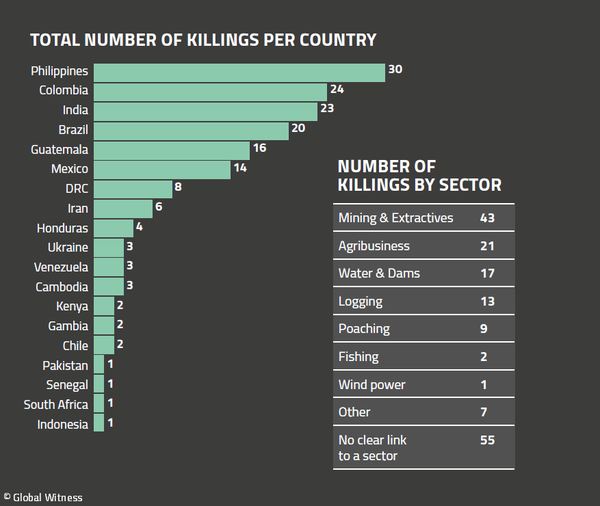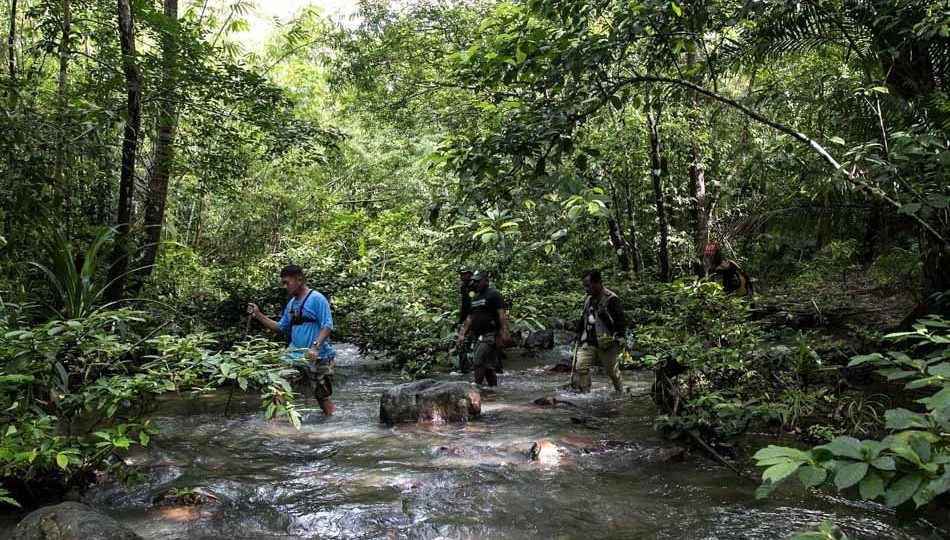The Philippines was the site where the most environmental defenders were killed in 2018, according to a report released today by watchdog Global Witness.

The Philippines tops the list that is comprised of 19 countries.
In 2018, 30 environmental defenders were killed in the Philippines. It was followed by Colombia, where 24 defenders were killed; India, which had 23; Brazil, which had 20; Guatemala, which had 16; and Mexico, which had 14.
Based on sectors, many of those killed globally were linked to mining and extractives (43), agribusiness (21), and irrigation (17).
The report said that Philippine President Rodrigo Duterte’s government intimidates environmental defenders by branding them as sympathizers of the Communist Party of the Philippines or labeling them as terrorists. Many defenders were either jailed or killed. Among many examples, the report cited the killing of nine farmers from Sagay City, Negros Occidental in October who were caught in the middle of a long-standing land dispute.
At present, many of the killings are occurring in Mindanao. Sixty-seven percent of those killed in 2017 were from the southern Philippine island, while a third of those who died in 2018 were from there as well. Global Witness tied this to the government’s plan to convert millions of hectares of land in Mindanao into industrial plantations which would be owned by foreign corporations.
The organization blamed the Philippine government for the death of the environmental defenders, many of whom were members of indigenous groups that were defending their ancestral lands.
“The Philippines Army, in particular, has been linked to numerous killings of defenders, working in collusion with powerful private interests. Meanwhile, the country’s legal system is used to criminalize and intimidate land and environmental defenders, while officials who are complicit in these crimes go unpunished,” the report said.
To protect these defenders, the group asked businesses to respect the rights of the people living in the lands which they plan to convert into industrial farms. It cited the case of Dole Philippines in Bukidnon which is allegedly leasing the land of a local businessman who supposedly took them from an indigenous group through fraudulent means.
“[G]iven the high risk of abuse, businesses operating in this context also have a heightened responsibility to respect the rights of local people. They should proactively ensure that the land they are profiting from – through both their own operations and those of their suppliers – has been leased legally, with the consent of the communities who live on it,” the report said.
The organization also called on the government to protect indigenous people from unscrupulous businessmen and corporations.
“The Philippine government must act to stop businesses and private actors from grabbing ancestral lands from its people, and from using violence and threats to silence those who object. It must also guarantee the right of communities to give or withhold their free, prior and informed consent regarding the use of their land.”
“It should support, not criminalize, those activists who stand up for their rights, and provide accountability for previous violations,” it said.
Global Witness ranked the Philippines number two in a study conducted in 2017, with 48 environmental defenders killed — the highest ever recorded in the country.




